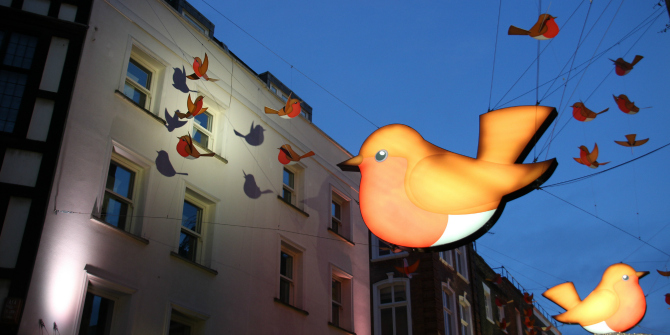After close to a decade of using twitter as an academic, Mark Carrigan reflects on why he has decided to leave the platform. Highlighting, the benefits of twitter, but also the increasingly institutionalised nature of academic social media and the way in which social media work has become a required, but unrecognised feature of academic labour, he suggests that twitter has become yet another contributing factor to the #exhaustionrebellion.
I wrote two years ago about my desire to escape what Richard Seymour calls The Twittering Machine. It’s a term which Seymour used in a series of blog posts leading to a book, invoking a painting of Paul Klee. As Dominic Pettman describes it in his book Infinite Distraction
 “This painting depicts largely featherless avian creatures, attached to a thin wire, which is itself connected to a hand crank. The legs and torsos of these highly abstract birds are as thin as the wire they are perched upon, and could even conceivably be extensions of it. Their provenance seems neither entirely organic nor completely mechanical. These are cyborg creatures that apparently sing at the turning of a handle (although no guiding hand comes into the picture). Some kind of pit or coffin, lit soft pink from within, seems to await beneath them, patient for the moment they drop off the perch. One art critic has described the painting as allegorically depicting mechanically captured animals, “their heads flopping in exhaustion and pathos.” Furthermore, “one bird’s tongue flies up out of its beak, an exclamation point punctuating its grim fate — to chirp under compulsion.”
“This painting depicts largely featherless avian creatures, attached to a thin wire, which is itself connected to a hand crank. The legs and torsos of these highly abstract birds are as thin as the wire they are perched upon, and could even conceivably be extensions of it. Their provenance seems neither entirely organic nor completely mechanical. These are cyborg creatures that apparently sing at the turning of a handle (although no guiding hand comes into the picture). Some kind of pit or coffin, lit soft pink from within, seems to await beneath them, patient for the moment they drop off the perch. One art critic has described the painting as allegorically depicting mechanically captured animals, “their heads flopping in exhaustion and pathos.” Furthermore, “one bird’s tongue flies up out of its beak, an exclamation point punctuating its grim fate — to chirp under compulsion.”
I’ve been haunted by this image since first encountering it, plagued by the sense of capture it represents. I was once a Twitter enthusiast, profoundly believing in its capacity to democratise the academy. Pretty much everything I’ve done as a researcher since my PhD has been concerned with subjecting that optimism to sociological scrutiny, as well as understanding the assumptions from which it originated.
This has left me with a clearer sense of why I think social media is so exciting from an academic perspective. The mass character of commercial social media platforms breaks down the stable boundaries between the university and wider society, opening up a liminal space in which new ways of working can thrive. The interaction orientated assumptions built into their architecture furthermore enables a much broader range of interactions than would otherwise be possible, destabilising the relatively enduring networks through which privilege is conducted and reproduced. Furthermore, I was convinced that a number of scholarly dispositions tended to follow from these engineering decisions: open-mindedness, curiosity, creativity and (sometimes) collegiality.
I’m far from uncritical of Platform Studies (e.g. it’s very bad at dealing with the problem of agency), but it has convinced me this analysis was largely incorrect. Even if platforms choreograph intellectual interactions which often contingently have these characteristics, this property emerges in spite of the architecture rather than because of it. It’s a property of scholars as a collective entity which is staged through the platform but not induced by it. In fact these latent possibilities are constantly counteracted by the forms of strategic conduct which platforms continually encourage, as they shape the mode of orientation to each other in profound yet indiscernible ways that secrete into our sense of what these interactions entail.
I completely believe there are pockets of valuable interaction, richly dispersed throughout academic and wider networks. I think they are akin to what Tony Lawson calls eudaemonic bubbles, collectively securing immensely valuable experiences for those participating in them. But, the professionalisation of Twitter within UK universities has progressively undercut this, as its use becomes something which intersects with the institutional context in deeply obscure and rapidly evolving ways. I worry it has come to be something which hybridises the personal and the professional in the most subtly violent manner, leading work to become life and life to become work.
I’m certain I’m not the only person who feels like this. I may however be an outlier with regards to the intensity with which I’ve felt it. Twitter has been integral to my working life for the last ten years in a dizzying array of ways which I’m unable to summarise succinctly beyond pointing to the 30+ Twitter accounts I’ve managed at different points in time, as well as the hundreds of thousands of tweets I’ve sent from them. I find it impossible at this stage to not relate to it as work… in this sense I struggle to step outside of a primarily practical engagement with it. Thus I just don’t enjoy it in the way I used to. In the second edition of Social Media for Academics I tried to summarise what happens when a practical mode of engagement meets the largest real time behavioural science experiment in human history:
Hopefully we can avoid this with social media because so much of what it means to use these platforms successfully rests upon being mindful of their use, as opposed to being forgetful as they fade into the background and become taken for granted parts of our working lives. This is even more crucial when we consider how platforms are being designed to subtly encourage our compulsive use of them, bringing behaviourism into our everyday lives in a manner which can be easy to guard against if we are aware of it but enormously difficult if we do not recognise that it is taking place.
The #exhaustionrebellion hashtag really hit home with me. In the last strike I hyperactively did stuff throughout the strike. It became an opportunity to intensify my labour rather than withdraw it. I blame Twitter for this. Or rather the particular mode of approaching it which I’ve unfortunately developed as a result of being someone who ‘does Twitter’ professionally. It’s a form of (largely) unpaid labour which I don’t enjoy, distracts me from what I do enjoy and permeates into every aspect of my life as work. I don’t want to do it anymore. Hence I no longer have a personal Twitter account. I’ve deleted my Instagram accounts. I’ll still be helping maintain some project Twitter feeds but these are unambiguously work in a way my personal account never could be. I’ll still be on LinkedIn. I’ll be writing my TinyLetter. I’ll be podcasting on Soundcloud. I’m going back to blogging as the thing which I’ve never lost enthusiasm for, in spite of other social media platforms taking my energy away from them more with each passing year.
I’m going to use social media rather than live in it, as Mark Fisher put it in a late essay. For precariously employed academics, it can be a powerful tool which is becoming increasingly difficult to dispense with. But it can also lead to a profound intensification of labour, as the relationality of your precarity increasingly defines the parameters of your professional self-conception. I made this video last week, brilliantly facilitated by Justin Hodgett, ironically when I was exhausted and began to realise how difficult I would find it to avoid trying to speed up during the strike:
I hope this doesn’t read as an anti-social media screed, because it’s not intended as one. I’ve just become increasingly pessimistic about how it is becoming institutionalised within the British academy, as well as the knock on effects this has for the user cultures which are rapidly emerging around it. I hope Social Media for Academics is read as an intervention in a still nascent debate concerning what it is, how we should use it and what it means for scholarship. This post is intended in the same spirit, albeit with a gloomier tone concerning its intersection with the reality of labour within the accelerated academy. There are serious problems which social media is throwing up within the academy, at a time of immense institutional upheaval and political volatility. I suspect they are going to get much worse before they get better and I want to direct my attention to empirically and theoretically engaging with these questions, as opposed to being dispositionally tied into my research object in way which is increasingly exhausting and counter-productive.
This doesn’t mean leaving social media, but it does mean leaving Twitter, in order to enjoy the greater distance between work and life which can be found on other platforms, as well as the indifference that the machinery of the accelerating academy still shows to them. Intellectually I want space, and personally I need space, that is increasingly difficult to find, when the Twittering Machine is so unambiguously operating within higher education.
Being a precariously employed minor micro-celebrity felt thrilling when I was doing my PhD. But almost six years later it’s become a position which just tires me out. I want a permanent position, time and space to improve my scholarship and work to be a bounded part of my existence. This is all vastly more likely to happen if I stop living in Twitter, as I’ve done for almost a decade. I started in 2010 and I like the idea of stopping before 2020.So goodbye Twitter. If you want me I’ll be here, here and here.
This post was originally published on Mark’s webpage, markcarrigan.net
Note: This article gives the views of the authors, and not the position of the LSE Impact Blog, nor of the London School of Economics. Please review our comments policy if you have any concerns on posting a comment below.
Featured Image Credit: Twittering Machine, Ina Centaur via Flickr (CC BY 2.0).









What took you so long? 😉
His addiction……
After close to a decade of using twitter as an academic, Mark Carrigan reflects on why he has decided to leave the platform. Highlighting the custom essay Mark Carrigan reflects on why he has decided thanks for post,